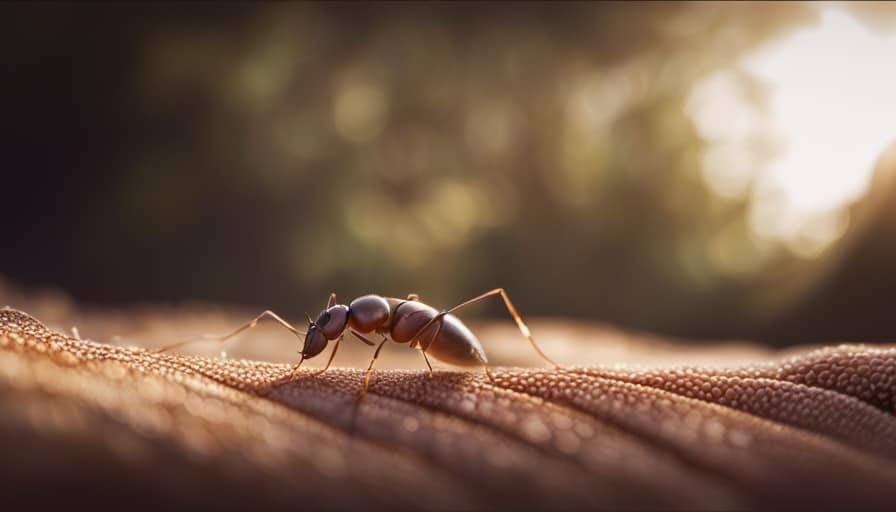Recently, I have been bothered by these annoying little flies in my home, and I must say, they are really starting to get on my nerves!
But fear not, because I’ve done my research and I’m here to share some expert tips on how to get rid of those tiny flies once and for all.
From identifying the different types of flies to using natural remedies and chemical solutions, I’ve got you covered.
So let’s dive in and bid farewell to these unwanted guests together!

Key Takeaways
- Identifying the common types of tiny flies in your house is important for effective pest control.
- Tiny flies are attracted to moist and decaying organic matter, such as overripe fruits and rotting vegetables.
- Natural remedies, such as vinegar and dish soap solutions, can be used to eliminate tiny flies from your house.
- Preventing future infestations of tiny flies involves maintaining a clean environment, sealing cracks or openings, and storing perishable items properly.
Identifying the Common Types of Tiny Flies in Your House
I can easily identify the common types of tiny flies in my house by observing their physical characteristics and behavior. Flies are attracted to our homes for various reasons, including the presence of food, moisture, and waste. It’s important to note that these flies can pose health risks, as they can carry and spread disease-causing organisms.
To identify the types of flies, I first look at their size and color. For instance, fruit flies are small and have a tan or brown color. Drain flies, on the other hand, are gray or black and have a fuzzy appearance.
Understanding the Reasons Why Tiny Flies Infest Your Home
To understand why tiny flies infest your home, it’s important to consider their attraction to certain conditions and factors within your living space.
These flies, commonly known as fruit flies or drain flies, are attracted to moist and decaying organic matter. They seek out common breeding grounds such as overripe fruits, rotting vegetables, and damp areas in your kitchen or bathroom.

These tiny flies are also drawn to standing water in sinks, drains, and garbage disposals. Signs of a fly infestation include the presence of numerous flies hovering around these areas, as well as the sighting of their larvae or pupae.
It’s crucial to address these conditions and remove any potential breeding grounds to effectively eliminate the infestation and prevent future occurrences.
Natural Remedies to Eliminate Tiny Flies From Your House
One effective way to eliminate tiny flies from your house is by using a combination of vinegar and dish soap. This homemade vinegar fly spray is a non-toxic and practical solution to get rid of those pesky insects.
Here’s how you can make it:

- Mix equal parts of vinegar and water in a spray bottle.
- Add a few drops of dish soap to the mixture. The soap helps to break the surface tension of the liquid, making it easier for the flies to drown.
- Shake the bottle gently to ensure the ingredients are well combined.
- Spray the solution directly onto the flies or in areas where they’re commonly found, such as near windows or fruit bowls.
This natural fly spray isn’t only effective but also safe for your family and pets. It traps and kills the flies without the use of harmful chemicals.
Give it a try and say goodbye to those tiny flies in your house!
Using Chemical Solutions to Get Rid of Tiny Flies in Your Home
Bleach is a strong and effective chemical solution that can help eliminate tiny flies in your home. Chemical solutions, such as bleach, can be highly effective in eliminating tiny flies. The strong properties of bleach make it a powerful tool for killing flies and destroying their breeding grounds. However, it’s important to use caution when using chemical solutions, as they can be harmful to humans and pets if not used properly.
When comparing chemical solutions to natural remedies for getting rid of tiny flies in your house, it’s important to consider their effectiveness.

In the next section, we’ll discuss methods for preventing future infestations of tiny flies in your house.
Preventing Future Infestations of Tiny Flies in Your House
I can take steps to prevent future infestations of tiny flies in my house by implementing proper sanitation practices. By maintaining a clean environment, I can greatly reduce the chances of reinfestation. Here are three key practices to incorporate:
-
Regularly clean and sanitize all areas of the house, especially the kitchen and garbage disposal areas. Empty and clean trash cans frequently to prevent any organic matter from attracting flies.
-
Seal any cracks or openings in doors, windows, and screens to prevent flies from entering the house. Repair any damaged screens to ensure they’re intact and functioning properly.

-
Store fruits, vegetables, and other perishable items in sealed containers or in the refrigerator. Flies are attracted to the odors of decaying food, so keeping it properly stored will deter them.
Frequently Asked Questions
How Do Tiny Flies Affect My Health?
Tiny flies can pose health risks, as they can carry bacteria and pathogens that can cause illnesses. To avoid health issues, it’s important to keep your house clean, dispose of trash properly, and eliminate any standing water where they can breed.
Can Tiny Flies Damage My Property?
Tiny flies can indeed cause damage to your property. Their larvae can infest and feed on organic materials, such as wood, causing structural damage over time. It’s important to address the issue promptly to prevent further harm.
Are Tiny Flies Attracted to Specific Food Sources?
Tiny flies are often attracted to specific food sources, such as overripe fruits or decaying organic matter. Understanding their breeding habits and implementing effective prevention methods, like proper sanitation and sealing entry points, can help keep them out of the house.

How Long Does It Take for Natural Remedies to Eliminate Tiny Flies?
In my experience, the speed of effectiveness of natural remedies versus chemical solutions for eliminating tiny flies can vary. While some natural remedies may work quickly, others may take longer to fully eliminate the flies. It’s important to be patient and consistent in your efforts.
Are There Any Long-Term Effects of Using Chemical Solutions to Get Rid of Tiny Flies?
Using chemical solutions to eliminate tiny flies in your house can have long-term environmental impacts. Consider using alternative methods like natural remedies or traps that are safer and more sustainable for the ecosystem.
Conclusion
In conclusion, it’s evident that tiny flies can be a nuisance in our homes. By understanding their types and reasons for infestation, we can effectively eliminate them using natural remedies or chemical solutions.
However, it’s crucial to prevent future infestations by maintaining cleanliness and proper waste management. Rest assured, with the right knowledge and approach, you can bid farewell to these pesky insects and enjoy a fly-free home environment.










